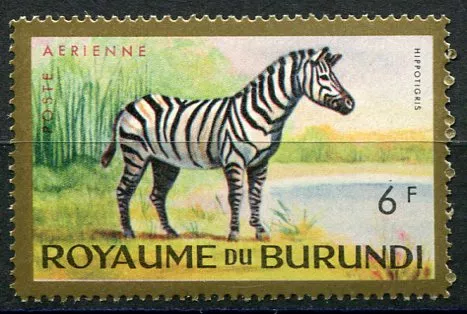- Home
- Philately: postage stamps
- Philately: stamps all over the world
- Africa
- Burundi
- (1964) MiNr. 102 A ** - Burundi - Aeronautical stamp - Burchell's zebra
(1964) MiNr. 102 A ** - Burundi - Aeronautical stamp - Burchell's zebra
Burundi - postage stamps.

| Code: | BUR-102A |
| Producer: | Burundi |
| Price: | 0,35 EUR |
| Availability: | In Stock |
| Stock: | 1 Pcs |
| Denomination of the stamp: | 6 F |
| Year: | 1964 |
| Condition: | ** |
| Catalogue no. (MICHEL): | 102 A |
| Cat. number (St. Gibbons): | 92 |
| Cat. number (Yvert et Tellier): | PA 1 |
Burchell's zebra (Equus burchelli): the unique striped pattern of the African savannah
The Burchell's zebra (Latin Equus burchelli, sometimes also referred to as Equus quagga burchellii) is one of the best-known subspecies of the zebra steppe. It is characterized by its unique black and white stripes, which do not cover the belly and gradually disappear on the hind legs. This pattern of stripes does not overlap and is unique to each individual, much like fingerprints on humans.
Occurrence and natural habitat
Burchell's zebras predominantly inhabit the savannas and open grassy plains of eastern and southern Africa, especially in countries such as Tanzania, Botswana, Namibia and South Africa. They are adapted to arid climates and large areas of sparse tree cover. They can travel hundreds of kilometres in migration patterns in search of water and food.
Social behaviour and herd structure
Beasts live in small family groups consisting of one stallion, several mares and their young. These groups are very cohesive and maintain a stable composition. The stallion protects the herd from predators, while the mares form strong social bonds.
The Burchell's zebra has a complex communication system involving vocal displays, ear position, tail position, and body contact. Social cohesion is key to herd survival in areas where constant danger lurks in the form of lions, hyenas or wild dogs.
Food and grazing
This subspecies of zebra is a typical grazer. It feeds mainly on grasses and prefers fresh, young shoots. Unlike ruminants such as antelopes or gazelles, zebras have a simple stomach and a lower ability to digest fiber. Therefore, they must consume larger amounts of food and graze for longer periods of time.
Zebras often migrate with other species, such as wildebeest or gazelles, and use their different food preferences to avoid competing with each other.
Conservation and current population status
Burchell's zebra was previously considered an endangered subspecies, mainly due to confusion with another now-extinct subspecies, the quagga (Equus quagga quagga). Today, however, the population of Burchell's zebra is relatively stable, although locally it faces pressure from habitat loss, poaching and conflict with human activity.
Thanks to conservation programs in national parks and protected areas, this species continues to enjoy a significant distribution. Its conservation is essential for the African savanna ecosystem.
Frequently Bought Together - (1964) MiNr. 102 A ** - Burundi - Aeronautical stamp - Burchell's zebra
From the Same Category - (1964) MiNr. 102 A ** - Burundi - Aeronautical stamp - Burchell's zebra
Bechuanaland Protectorate - postage stamps
Burundi - postage stamps.
Burundi - postage stamps. (*VV) - on stamp 24I oval groove in paper from overprint die - manufacturing defect The Lion (Panthera leo): the King of the Savannah and his secrets The lion, the majestic beast known as the king of the beasts, is a symbol ...





